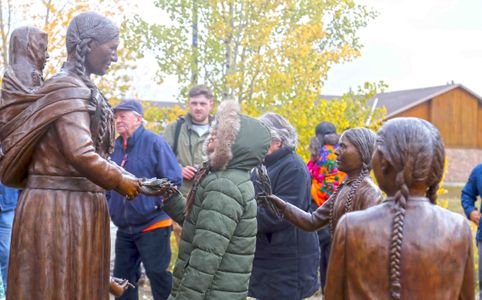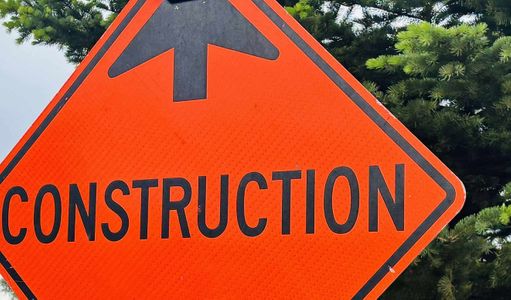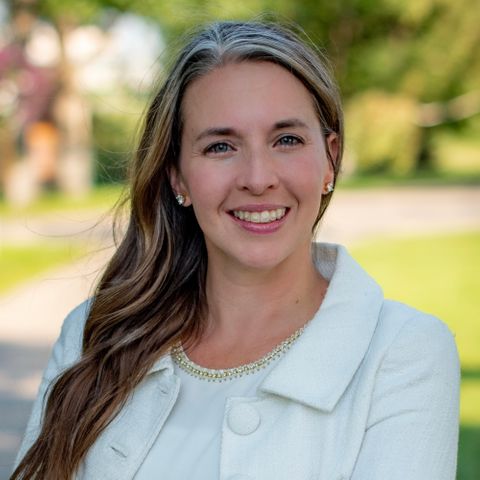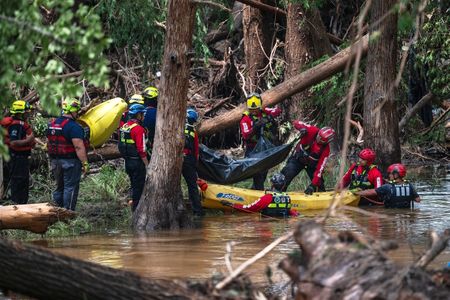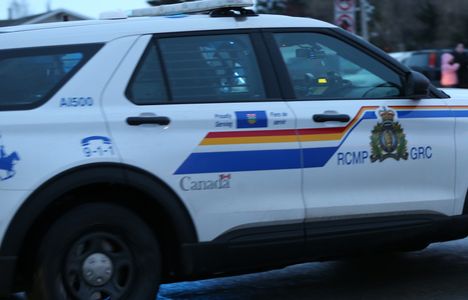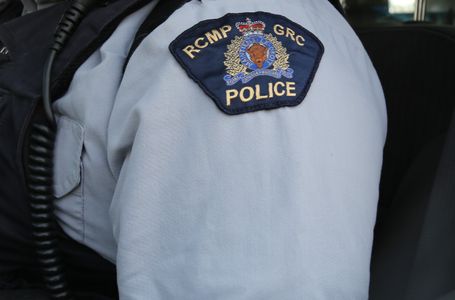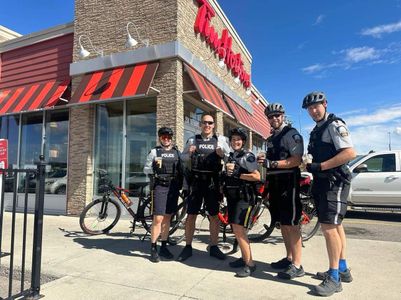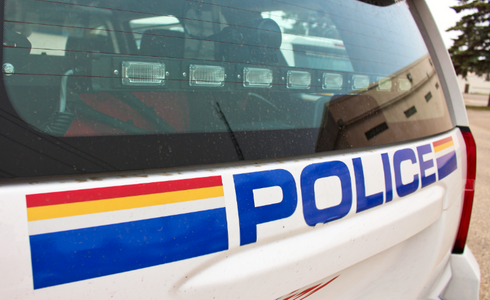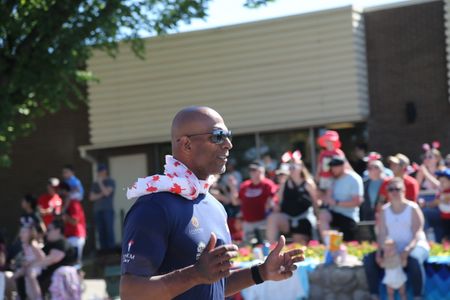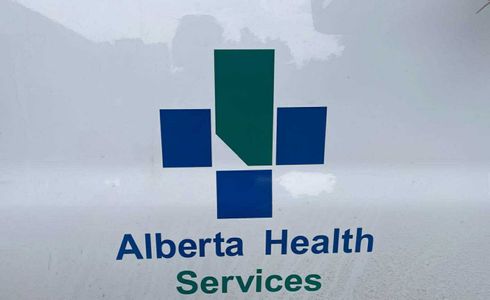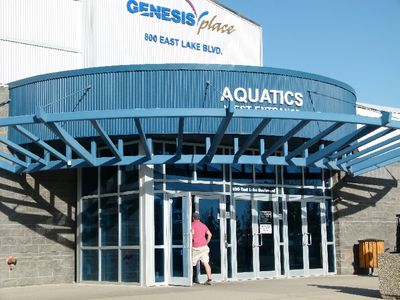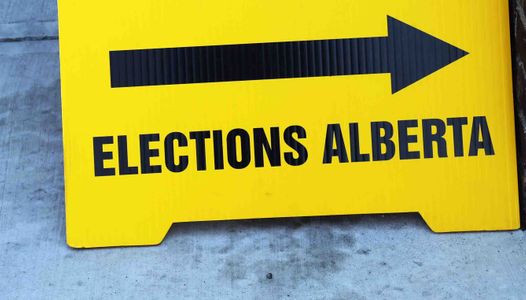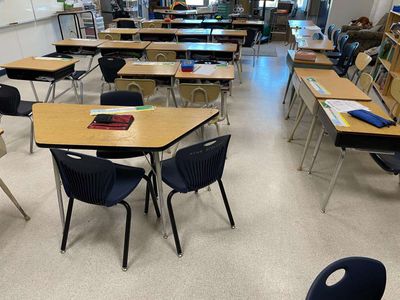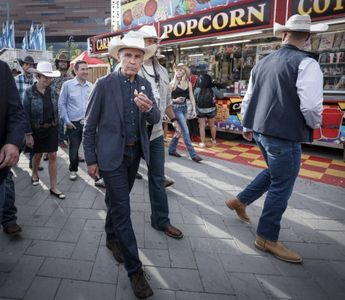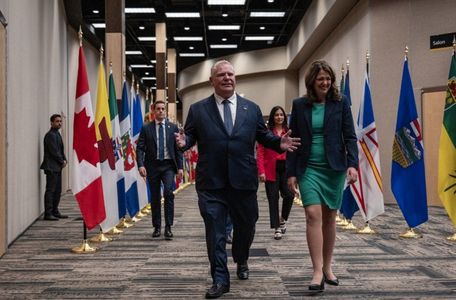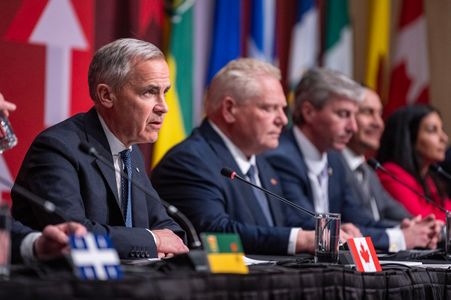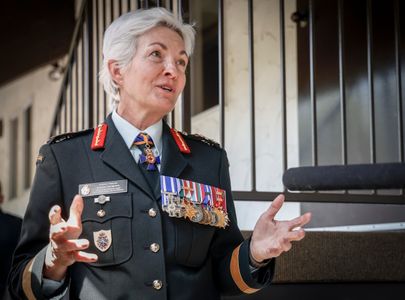Local News
From councillor to mayor: Tina Petrow lays out approach to Airdrie’s challenges
Tina Petrow, a two-term councillor first elected in 2017, is running for mayor in the Oct. 20 municipal election. Petrow has lived in Airdrie since 2012 and served as chair of council’s Community and Corporate Services Committee. She also sat on the Community Infrastructure and Strategic Growth Committee, was an alternate on the Calgary Metropolitan Region Board before it was disbanded, and served on the Rocky View Foundation board of directors, according to the City of Airdrie. In an interview with DiscoverAirdrie, Petrow said Airdrie is “actually entering a new chapter right now, and with that comes the opportunity for fresh leadership.” She said she wants to bring “a collaborative, forward-thinking style that will help to set a new tone at the council table, one rooted in respect, innovation and community-first decision-making.” She added, “At the end of the day, I’m an idea person, and I believe Airdrie is ready for new ideas, whether that is rethinking advocacy strategies, pushing for regulatory changes or enhancing transparency through things like a mayor’s report to the community or town halls. And those are things that I would like to do in the role of mayor. I’m committed to leading with vision and heart.” “I love this community. I’ve shown up, listened, and worked hard every day because I believe Airdrie deserves experienced leadership that’s both compassionate and capable,” she said in written answers. On her campaign website, Petrow pledged to deliver a quarterly mayor’s report outlining meetings, advocacy progress and city department updates, and proposed more opportunities for public Q&As with the mayor or council. Background and track record On her campaign website, Petrow highlights more than 20 years of management experience, which she says has taught her how to lead with purpose and bring out the best in her team. “I’ve been through eight budget cycles now, and I’m a fine-tooth-comb kind of person. I take a couple weeks to go through those documents, line by line,” she said. “Being that leader of council comes with a great deal of responsibility to mentor new people when they’re coming in and having been a new councillor already, it’s really easy to know what you need to know to get ready for that budget,” she added. “I think one thing I love about this role is the ability to be mentored, and also to be a mentor to others.” Recreation affordability One of the most debated issues among residents and councillors has been the affordability of recreation. Petrow said council was told “a swim-only pass significantly increased the tax subsidy for aquatics from the current 20% subsidy to as much as 50% … that could mean up to $450,000 in lost revenue, which would need to be recovered through property taxes. During that meeting, we also reviewed regional examples, where two facilities tried swim-only passes but returned to single admission due to financial and administrative challenges.” She added in written responses: “Any changes would affect the level of subsidization, not the operating costs. That’s why public input is essential, and I’d support including this in an upcoming community survey to gauge comfort and priorities.” According to an administration report attached to the March 4, 2025 User Fees and Charges Policy Update, split passes could reduce revenues by 9 to 13 per cent and push the tax subsidy above 20 per cent. The report said 87 per cent of pass holders use the fitness centre, 77 per cent the pool and 34 per cent participate in dryland or leisure programs, with peak-time capacity already constrained. Council accepted the report for information and endorsed the policy update, without directing changes to the all-access model. The same attachment projected nearly $500,000 in Fair Access subsidies for 2025 and confirmed the all-access pass will extend to the Francosud Gymnasium in 2027 and the Southwest Recreation Facility in 2028. Housing Housing policy, particularly the issue of accessory suites, has been one of the council’s most divisive debates. On Dec. 17, 2024, council advanced Bylaw B-30/2024 to amend the Land Use Bylaw, with first and second readings carried 5–2. Councillors Al Jones and Tina Petrow opposed. Council amended the bylaw to make suites a discretionary use on cul-de-sac lots, defining a cul-de-sac as “a street or passage that is closed at one end.” The administration informed the council that the change would apply broadly in new communities, while pre-annexation areas would continue to treat suites as discretionary. Petrow said at the time, “I do support accessory suites in general as a positive addition to our housing diversity. During that conversation, we moved from under 1% of homes allowing suites as a permitted use to over 70% of homes in our community, which I personally thought was too broad. I’ve consistently advocated to not use blanket policies favouring thoughtful planning. Instead.” In written answers, Petrow pointed to the December decision, illustrating that council votes are not always unanimous. “I know I myself have voted against multiple items for various reasons, be that financial, procedural or community impact reasons. I can think of many, many, many times in my eight years that the votes have not been unanimous.” She added: “The bylaw passed with amendments and a commitment to revisit the issue in Q2 2026, reviewing applications and community feedback. With this, I look forward to seeing the report come back to gauge the impact of the decision and propose any amendments if needed.” Growth management Council approved the East Nose Creek Community Area Structure Plan on Sept. 2, 2025. The plan covers roughly 450 hectares (seven quarter sections) and is projected to accommodate 5,103–5,740 homes, 14,338–16,131 residents and about 3,400 jobs over 20–30 years. Council passed the plan unanimously among those present, with Mayor Peter Brown and Coun. Darrell Belyk absent. In her written answers, Petrow emphasized that CASP approval is only the first step in the planning process and does not constitute authorization for development permits. “In land-use planning, development follows a staged process: starting with a CASP Justification, then the CASP itself, followed by a Neighbourhood Structure Plan, then all the way down to the development permits.” Council also directed administration to meet with residents of the “special study area” to address concerns raised during the hearing. Infrastructure and regional growth On July 30, the Government of Alberta announced $50 million toward a project to connect Airdrie’s wastewater system to Calgary’s treatment plant. The province said the $114-million project includes a seven-kilometre pipeline and a regional approach that eliminates the need for a new treatment facility, supporting projected growth of 45,000 housing units across annexed lands. Provincial quick facts also noted 10,000 acres of developable land in east Airdrie, accessed through the recently completed 40 Avenue/Highway 2 interchange. In an Aug. 8 written response, the City of Airdrie said its $64-million share will be financed through municipal debt repaid by developer levies, with no property tax or utility rate increases expected. The City added design work has begun, while the province’s July 30 notice said design would begin later in 2025, with construction in 2026 and completion by 2027. “We have regional cost-sharing agreements that are in place with our neighbouring communities, and they are reviewed regularly… I’ve secured very good relationships with our neighbouring communities as well to be able to advocate and get those through, to ensure that all of us are sharing in the services that collectively, we use as a region,” Petrow said. On Aug. 28, Airdrie and seven neighbouring municipalities launched Invest Greater Calgary, a three-year pilot hosted by Calgary Economic Development to attract investment, share data, and coordinate regional marketing. The agreement includes Airdrie, Calgary, Chestermere, Cochrane, Foothills County, High River, Okotoks and Rocky View County. According to the City’s 2025 municipal census, Airdrie’s population reached 90,044 as of April 1. Administration projects growth to 97,204 in 2026 and more than 135,000 by 2034. Recreation facilities In written answers, Petrow pointed to the timeline for the southwest recreation centre, noting the city bought the land in 2018, plans to open the first phase in 2028, and complete build-out by 2035. She said the phasing is deliberate and responsible, balancing priorities such as fire halls and road projects, but added she would be open to accelerating construction if community demand and financial data support it. She also said phasing “gives us flexibility to pursue grant opportunities that may arise during the project, helping us maximize value for the community while managing financial risk.” Transportation According to the City’s 2025 mid-year focus-areas update, the Transportation Master Plan is complete and audible crosswalks were installed on Main Street in June, with 18 more intersections slated over the next two years. Design and modelling for Yankee Valley Boulevard improvements continue, and grade separation under the CPKC has been shifted to 2029 in the 10-year capital plan. On her campaign website, Petrow lists transportation as one of four priorities. Her action plan includes advancing the Yankee Valley Boulevard and Veterans Boulevard rail grade separation projects, progressing regional conversations around a rapid transit corridor on 24th Street, and an Airdrie–Calgary biking and walking trail. She also pledges to monitor crosswalk safety issues, review Airdrie Transit fee structures and routes, investigate integrated regional service into Calgary, and pursue strategies to improve intersection and traffic safety, light timing and accessibility. “Everyday, I spend a lot of time driving around this community. I see the challenges, and the successes — and my commitment to you is to always keep finding new ways to keep you moving in a safe and efficient manner,” Petrow wrote. Leadership and style Petrow described her overall approach as data-driven. “I think it’s about looking at each, each decision that we make on an individual basis, and you have to do that based on the data that’s presented to you. Your own research and due diligence … and then the feedback that comes from the community.” She added, “We see sometimes that [to one] resident that this is the most important thing to them, but the other, 89,000, that’s not the most important. So balancing out where the most community benefit comes into that, paired with that information and the data and best practices that we’ve seen.” Fresh leadership vs. status quo Petrow said her approach as mayor would emphasize teamwork at the council table. “Moving into this new role as mayor, I will shift from being one voice at the table to setting the tone for the council,” Petrow said in the Sept. 18 interview. “And this role isn’t about doing it alone. It’s about building a strong, united team that challenges the status quo and works together to find smart, sustainable solutions for our city.” In written answers, she added: “No single member of council, including the mayor, can implement decisions alone. The mayor is one of seven voices, and priorities are set collaboratively by the full council, based on community feedback.” According to the City, council consists of a full-time mayor and six part-time councillors, all of whom are elected every four years. Budget, taxes and fiscal pressures Airdrie’s 2025 Tax Rate Bylaw set the residential mill rate at 0.00645561 and the non-residential mill rate at 0.01242166. Council authorized the collection of $90.15 million in municipal taxation to fund operations, debt repayment, capital projects and reserves. For the median single-family home assessed at $614,000, the bylaw adds $27.90 per month — $9.37 municipal and $18.53 provincial education. Council documents describe the increase as the largest year-over-year in the city’s history, driven largely by a 25 per cent rise in the provincial education requisition. In written answers, Petrow said: “We’ve seen this with the financial impacts of Bill 20 and federal RCMP agreements.” Petrow said fiscal responsibility is one of her priorities. “I would never say that I can guarantee anything on taxes, because we’ve seen how quickly our environment shifts and our economy shifts.” On her campaign website, she pledges to pursue a 75/25 residential-to-non-residential tax split, citing the city’s current ratio at “around 85/15.” The 2025 bylaw confirms Airdrie maintains a 2.1:1 tax rate ratio between residential and non-residential classes, compared with Calgary’s 3.5:1. Treasury Manager Monica Labait told council the city has adjusted tax notices to clearly show the split between municipal and provincial charges. Healthcare Healthcare has been one of the city’s top advocacy items. Healthcare is a provincial jurisdiction; however, municipalities can advocate on behalf of their residents. In 2022, Alberta Health Services temporarily closed Airdrie Urgent Care overnight on weekends due to a shortage of physicians. AHS said at the time: “The Urgent Care Centre (UCC) at the Airdrie Community Health Centre will be temporarily closed overnight on Friday, Saturday and Sunday evenings from 10 p.m. until 7 a.m. the following mornings for approximately eight weeks due to gaps in physician coverage.” A month later, AHS announced: “Four new physicians have been recruited and will start work at the Airdrie Urgent Care Centre in the coming weeks … These new physician recruits will provide ongoing support and allow us to return to 24/7 urgent care services in Airdrie.” Petrow said, “Airdrie has grown so much, and we are the fifth largest community in this province, and I think our province is acknowledging that and starting to put priorities in our community.” She added, “Sometimes, if we recognize that one advocacy strategy isn’t working, we shouldn’t stay with that one continuously. We should shift and find a way that works a little bit better.” In written answers, Petrow pointed to the $3 million planning funds for a proposed North Regional Health Centre. “Right now, we know the province is restructuring, and some projects are delayed... I requested an update on the $3M planning funds for the proposed regional health centre. The minister’s office confirmed that the acute care pillar will lead the work, but they’re still on hold. I’ll continue pushing for updates and will request that the ministry present their plan in Airdrie once it’s ready.” “At the end of the day, the province is responsible for delivering healthcare,” Petrow said. “But as a city, we can’t be silent when the needs of our community aren’t being met.” Earlier this month, the province announced that its $8.4-million renovation of the Airdrie Community Health Centre expanded urgent care capacity by 37.5 per cent through reconfigured space. However, the province emphasized that the capital funding did not include new operating funds. The Sept. 9 opening added six treatment spaces, including a trauma and negative-pressure room, an EMS parking area inside urgent care, a dictation room, and expanded triage and waiting areas as part of Phase 2 of a three-stage project. Affordable housing On her campaign website, Petrow says she would “continue to work towards our community’s Affordable Housing Principled Action Plan” — adopted by council in June 2023 — and “increase access to comfortable, affordable homes for seniors,” including advocacy for levels of care “from independent living all the way to SL4, long term and hospice.” The city followed that plan with a September 2023 Affordable Housing Incentive Policy, exempting permit fees for non-market projects. According to the City of Airdrie’s April 28, 2025, Affordable Housing Capital Investment Plan report, the city outlined a $39-million investment scenario aimed at creating 195 new below-market homes by 2034. The plan was designed to be financially sustainable without increasing the city’s corporate debt ceiling. Trade-offs In written answers, Petrow addressed the trade-offs facing council as Airdrie tackles billion-dollar infrastructure needs. “This isn’t about a single trade-off — just like a campaign can’t hinge on one issue. Our approach must be balanced and thoughtful. Council decisions shouldn’t be made impulsively or as campaign promises; they require education, investigation, and a holistic view of the community. Every decision has ripple effects. That’s why we need leaders with both vision and attention to detail — able to anticipate unintended consequences. I stand behind every decision I make because it’s grounded in thorough research and answered questions, with no lingering ‘what ifs.’” She pledged to keep residents involved: “Through quarterly mayor’s reports and town halls, we’ll stay informed, engaged, and make tough decisions together as we grow.” Personal background Petrow has lived in Airdrie since 2012 and is married with two children. She has a background in business management, event management and mediations, according to her city council biography. She has volunteered with the Boys and Girls Club of Airdrie, the Food Bank, Airdrie Health Foundation, Festival of Lights, Rocky View Schools, Nose Creek Players, Creative Airdrie, the Airdrie Public Library and Volunteer Airdrie. Her roles have included event director for the YAY Airdrie campaign, coordinator for the 2014 Alberta Summer Games VIP Gala, the 2020 Alberta Winter Games Tour and the 2017 Rocky View School graduation banquets. In 2016, Petrow was nominated for a Soul of Airdrie award and received the Boys and Girls Club of Airdrie Starfish Award and the Donna McKinnon Memorial Award. Election context Candidate nominations for the 2025 Airdrie municipal election closed Sept. 23 at noon. The City’s public register lists seven names for mayor: Dave Douglass, Dylan Harty, Usman Mahmood, Tina Petrow, Eeshnah Qureshi, Vern Raincock and Heather Spearman. Petrow and Spearman are the only incumbent councillors seeking the mayor’s chair. Fellow incumbents Darrell Belyk, Ron Chapman, Candice Kolson and Al Jones are running again for council. The council ballot also includes Tomisin (Tomi) Adenipekun, Christopher Bakke, Kurt Bigoraj, Darrin Budzak, Craig Dansereau, Chris Glass, Inderjeet Kaur, Kathlene McCuaig, Rekha Mehay, Anthony Morvillo, Simisola Obasan, Jay Raymundo, Maulik Shah, Kristen Shima, Shaganpreet Singh Sooch, Chad Stewart, Tanveer Taj, Karen Whittenbury and Tammy Yantz.
